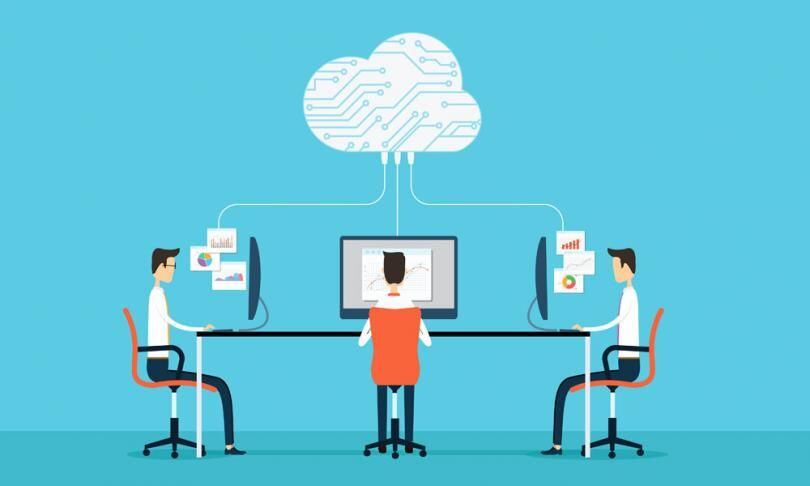The ideal infrastructure for deploying virtual apps and desktops is being considered by many...
Cloud Computing

What is Cloud Computing?
Any type of hosting service that is offered through the internet is referred to as cloud computing. Servers, databases, software, networks, analytics, and other cloud-based computing tasks are frequently included in these services.
Users of the service may access files and applications stored in the cloud from any location, removing the requirement to be physically present at all times. User-created documents and spreadsheets, for example, had to be saved to a physical hard drive, USB drive, or disk in the past. The files were unavailable outside of the machine on which they were created unless there was some form of a hardware component. Few individuals are concerned about fried hard drives or USB drives that have been lost or ruined as a result of the cloud. Because the papers are stored on a network of hosted computers that transport data over the internet, cloud computing makes them accessible from anywhere.
Cloud Computing Service Types
SaaS (software as a service), platform as a service (platform as the service), and infrastructure as the service are the three main types of cloud computing services (IaaS).
Software-as-a-Service
The most popular sort of cloud service is SaaS. We all utilize it regularly. The software can be accessed via a web browser or an app using the SaaS model. Although some SaaS services are completely free, others demand a monthly or annual fee to keep the service running. SaaS solutions are major popular in the corporate sector since they don’t require any hardware installation or upkeep. Salesforce, Dropbox, and Google Docs are just a few examples.
Platform-as-a-Service
It’s a cloud-based platform that allows you to create and deploy web applications. Users may create, test, deploy, maintain, and upgrade apps over their entire lifespan using PaaS. Development tools, middleware, and business intelligence solutions are all included in the package. Windows Azure, AWS Elastic Beanstalk, and Google App Engine are just a few examples.
Infrastructure-as-a-Service
Users can utilize IaaS to access fundamental computer infrastructure features such as data storage, servers, and hardware in the cloud. Businesses may use IaaS to access huge platforms and apps without having to build their physical infrastructure. DigitalOcean, Amazon EC2, and Google Compute Engine are just a few instances of IaaS.
How Does Cloud Computing Work?
The cloud is essentially a satellite network that allows people to share information in a decentralized manner. The hosting business is in charge of managing the vast data centers that offer the security, storage capacity, and processing power required to keep all of the data that customers transmit to the cloud safe.
Major firms such as Amazon (Amazon Web Services), Microsoft (Azure), Apple (iCloud), and Google (Google Drive) are the most well-known cloud providers, but there is also a slew of smaller and larger businesses. In addition to offering the end-user an ecosystem that can communicate between devices and programs (e.g., download a song on your laptop and it’s instantly synced to the iTunes software on your iPhone), these hosting companies can sell the rights to use their clouds and store data on their networks.
Generally, cloud computing follows three delivery models:
Public
This is the most common, and all of the above-mentioned players (Amazon, Microsoft, Apple, and Google) have public clouds that can be accessed from any location with the correct web app and login credentials.
Private
The infrastructure needs (hosting, data storage, IT personnel, etc.) are provided by the firms or consumers of the service, and this model gives the same level of flexibility as the public cloud. The private model also has an added degree of protection due to the restricted access and hands-on supervision of hosting.
Hybrid
The public and private cloud computing paradigms are combined in hybrid cloud computing. The two forms of cloud are connected via the internet and can exchange resources as needed (e.g., if the private cloud reaches storage capacity or becomes corrupted, the public cloud can step in and save the day).
Uses

Cloud computing is used in some interesting and innovative ways by both businesses and people. Here’s a short look at several more major application areas, in addition to some of the instances already mentioned.
Communication & Collaboration
From Google Calendar to Gchat, the whole Google suite of services is cloud-based. Popular programs like Skype and WhatsApp are also available, allowing users to interact and work on a worldwide scale.
Entertainment
Netflix and Hulu, which store massive databases of movies and TV episodes available via the cloud, have emerged as a result of a combination of cloud computing and dramatically increased internet bandwidth. These and other firms, such as Spotify and Tidal, can operate because of the cloud.
Big Data Analytics
Using big data to find patterns and insights was a time-consuming and costly process before the cloud. All of this has changed thanks to the cloud, which has eliminated the necessity for in-house development resources when it comes to data compilation and analysis. Companies may now collect data from some sources, connect it to the cloud, and search for real-time insights.
Business Processes
Innovative applications such as Salesforce, Slack, and a slew of others meant to improve and streamline the day-to-day operations of businesses would not be possible without the cloud.
Backups
The issue of data loss and recovery on traditional hard drives is being addressed by cloud computing. The majority of people who have had a computer have had to deal with the worry of losing important information. Cloud computing provides an easy-to-access backup option for keeping data secure, whether it’s a term paper, family photographs, or corporate payroll.
Here at CourseMonster, we know how hard it may be to find the right time and funds for training. We provide effective training programs that enable you to select the training option that best meets the demands of your company.
For more information, please get in touch with one of our course advisers today or contact us at training@coursemonster.com
